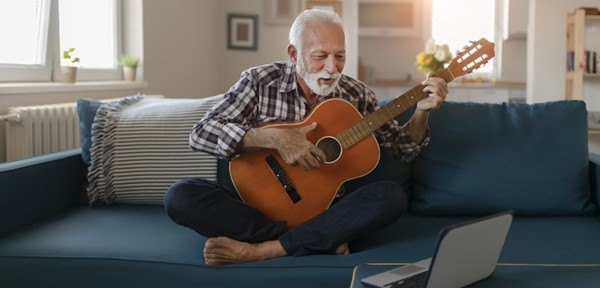Turn up the tunes to tune up your mind
Whether you’re keen to perform or just humming along, the power of music – no matter the genre — has a profound effect on your mental health. Science has proven what art has intoned since the dawn of civilization: that music delivers joy, comfort and social connection. But a recent study also suggests that making melodies with others may help our immune system even while affecting a dozen or so key brain functions.
In June 2021, Israeli and American researchers published a study in the American Psychological Association journal, PsychNet, showing that music helped “allow our brains to feel connected even without face-to-face interactions” during the darkest days of the pandemic. Whether making music together (think balcony singers and remote renditions of the Happy Birthday song over Zoom) or tuning in to a socially distant performance (like live-stream concerts from performers such as the New York Metropolitan Opera and gospel icon Marvin Sapp), music kept us in sync.
The study examined what happens in our brains when we listen, dance or sing to our favorite tunes: Music dials up key brain functions including feelings of empathy, a sense of social belonging and lower stress hormone levels such as cortisol, all while allowing us to experience greater pleasure. The most powerful finding to note? All of those benefits contribute to music’s power to help heal the body.
Click on the tunes below to see what song resonates with you!
According to the medical experts at the Global Council on Brain Health, in addition to awakening and requiring mathematical and linguistic precision, making music can engage multiple parts of the brain, including skills involving emotion, memory, attention and thinking. The panel’s recent report linking the brain and music recommends listening to music while exercising as motivation to keep moving and to give yourself a mental lift.
Speaking of exercise, dancing benefits the brain and the body because it relieves stress, improves balance and increases activity in the brain’s fornix — a nerve bundle that plays an important role in memory. A study published in the journal Frontiers in Human Neuroscience shows that older people who routinely partake in physical exercise can reverse the signs of aging in the brain – and dancing is the activity that brings the most profound effect.
Furthermore, research at Emory University found that musical activity preserves cognition as you age. In an oft-cited study, musicians between the ages of 60 and 80 sustained a range of cognitive benefits including memory and other nonverbal abilities like visuospatial judgement, if they played for at least 10 years of their life. Other studies have shown that when we’re playing an instrument, different parts of the brain engage in simultaneous processing of a variety of information at an amazing speed, with visual, auditory and motor cortices being especially active.
Envisage helps you to develop a healthy mind and body through our Wellness Education for Long-Term Living (WELL) program and partnership with Masterpiece, which focuses on emotional, physical and social well-being, along with peace & fulfillment




